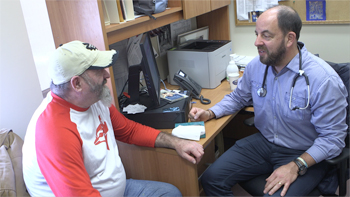Celebrating 25+ years of providing multidisciplinary HIV care

By Evelyne Jhung
World AIDS Day 2017
Watch this short video about how our primary care team has been caring for people with HIV for more than 25 years.
When Allan Carpenter was diagnosed as HIV positive in 1990, he was told to quit his job and make a will as he had only six months left to live. “There was a group of 10 of us at the time, including my boyfriend and best friends, and I’m the only one who’s still alive,” said Carpenter, 60.
Despite his diagnosis and watching many friends die, Carpenter says that something drove him on.
“Half of it was the medical team,” he said. “I’ve met so many amazing doctors, nurses and other health workers who were so kind, compassionate and enthusiastic about helping me and wanting me to get better. I had a whole team of people at 410 who provided not just medical help, but help with my life!”
The HIV Program of St. Michael’s Family Health Team at 410 Sherbourne Health Centre is unique in Canada. Patients are treated by a multidisciplinary team that includes primary care doctors, HIV nurses, an HIV pharmacist, a social worker, a dietitian and physiotherapists. At all other academic centres, people diagnosed with HIV are treated by an infectious diseases specialist, not a family doctor.
In fact, a number of the clinic’s team members were the original cohort of hires by the Ministry of Health and Long-Term Care AIDS Bureau in the 1980s when the province recognized the need to make available HIV care not at a hospital, but in the community setting. Many of these original hires are still working together at St. Michael’s Health Centre at 410 and caring for the same patient population for almost as long.
“I’ve been working with many of the same patients for over 20 years; the continuity and the connections I’ve been able to develop with them over the years has been a privilege. Although many of my patients died in the early years, I’ve been able to see some return to work or start a family.” |
“We see a pretty hard-to-reach and challenging HIV patient population. They struggle with isolation; stigma; mental health; addictions; incarceration; aging; other health issues, like chronic pain and diabetes; inadequate accommodations; or precarious employment – all of which takes a toll on their physical health,” said Dr. Gord Arbess, a staff physician in the Department of Family and Community Medicine.
For patients who are HIV positive, a health centre like 410 Sherbourne means they can get help with what’s important to them, whether it’s finding housing; getting mental health or addictions support; fighting discrimination; or getting back on their medications after being released from prison.
“They’re all there to help me on this journey and they make things easier, whether it’s being able to see a social worker or getting your flu shot on site,” said Carpenter.
“No other field has changed so dramatically in such a short period of time. It used to be a death sentence in the early days, but now, people with HIV – while they still struggle – can live relatively normal lives and many of my patients have aged along with me,” said Dr. Arbess.
For Carpenter, the team at 410 Sherbourne was a lifeline that’s allowed him to now be able to live as a ‘normal’ person in the community.
“I’m looking forward to start living again. I feel like my life is beginning again at 60!”
As for the other half of that ‘something’ that drove Carpenter? “Me! I did all the friggin work! But if I ever won the lotto, it’d go to all the teams at St. Michael’s who’s ever helped me.”
RELATED:
- Positive Care Program
- Positive Pregnancy Program
- St. Michael’s and Casey House
- Three decades of AIDS
- Health Centre at 410
About St. Michael’s Hospital
St. Michael’s Hospital provides compassionate care to all who enter its doors. The hospital also provides outstanding medical education to future health care professionals in more than 29 academic disciplines. Critical care and trauma, heart disease, neurosurgery, diabetes, cancer care, care of the homeless and global health are among the Hospital’s recognized areas of expertise. Through the Keenan Research Centre and the Li Ka Shing International Healthcare Education Centre, which make up the Li Ka Shing Knowledge Institute, research and education at St. Michael’s Hospital are recognized and make an impact around the world. Founded in 1892, the hospital is fully affiliated with the University of Toronto.
